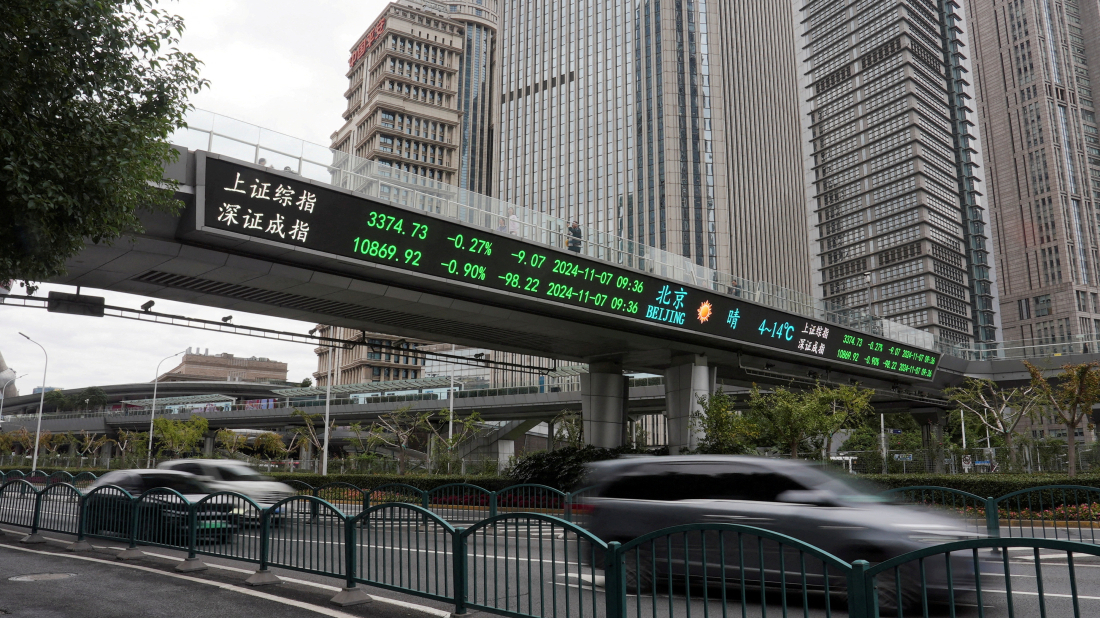U.S. confirms troop deaths: All the latest news on Middle East conflict
The widening war between Iran, U.S. and Israel is leaving civilians and soldiers caught in its wake. Thousands are stranded across the Gulf, flight...

Volkswagen, a key player in the global automotive industry, has finalized the sale of its manufacturing plant and testing facilities in Xinjiang, China, marking a significant shift in its operational strategy.
Volkswagen, a key player in the global automotive industry, has finalized the sale of its manufacturing plant and testing facilities in Xinjiang, China, marking a significant shift in its operational strategy. The facility, located in Urumqi, along with testing tracks in Turpan, has been sold to the Shanghai Motor Vehicle Inspection Certification (SMVIC), a subsidiary of the Shanghai Lingang Development Group. While financial details of the transaction remain undisclosed, the move reflects Volkswagen’s broader goals of streamlining its operations and pivoting toward sustainable growth in the electric vehicle (EV) sector.
China remains Volkswagen’s largest market, and the decision to sell the Xinjiang plant aligns with its strategy to focus on high-growth segments such as electric and intelligent vehicles. The company, in partnership with SAIC Motors, plans to introduce 18 new models by 2030. This aligns with the rapid expansion of China’s EV market, which now accounts for nearly 45% of total car sales, a figure expected to rise significantly in the coming years. By reallocating resources, Volkswagen aims to enhance its competitiveness in this crucial sector.
The decision to sell the Xinjiang facility is also part of Volkswagen’s broader efforts to optimize its global operations. The plant, operational since 2013, was among several facilities under review as the company seeks to manage costs and improve efficiency. Alongside its emphasis on EVs, Volkswagen is investing in technologies to transform traditional vehicles into smarter, connected systems, reflecting evolving consumer preferences and industry trends.
The extension of Volkswagen’s joint venture with SAIC Motors until 2040 underscores its commitment to the Chinese market. The partnership, initially established four decades ago, has delivered over 28 million vehicles to Chinese customers and continues to play a pivotal role in the company’s strategic vision. This extension provides long-term planning security and supports Volkswagen’s goal of maintaining a leadership position in the rapidly evolving automotive landscape
Volkswagen’s sale of the Xinjiang plant reflects a broader trend among global automakers to adapt to changing market dynamics. With increasing competition from domestic Chinese manufacturers, particularly in the EV segment, international companies are re-evaluating their footprints and strategies to ensure sustained relevance. The sale also allows Volkswagen to direct greater attention to research, development, and production of EVs, a segment where innovation and agility are paramount
By recalibrating its operations in China, Volkswagen is positioning itself to thrive in one of the world’s most competitive automotive markets. The sale of the Xinjiang plant, while a major decision, aligns with its long-term vision of sustainable growth and technological leadership.
The Kremlin is utilising the recent United States and Israeli military strikes on Iran to validate its ongoing war in Ukraine. Russian officials are pointing to the escalation in the Middle East as evidence that Western nations do not adhere to international rules.
Saudi Arabia’s state oil giant Saudi Aramco closed its Ras Tanura refinery on Monday following an Iranian drone strike, an industry source told Reuters as Tehran retaliated across the Gulf after a U.S.-Israeli attack on Iranian targets over the weekend.
The Middle East crisis intensifies after the deadly attack on the compound of the Supreme Leader of Iran Ali Khamenei on Saturday that killed him, other family members and senior figures. Iran has launched retaliatory strikes on U.S. targets in the region.
U.S. President Donald Trump said the U.S. military has enough stockpiled weapons to fight wars "forever"; in a social media post late on Monday. The remarks came hours before conflict in Iran and the Middle East entered its fourth day.
Türkiye raised its security level for Turkish-flagged vessels in the Strait of Hormuz to Level 3 on Sunday (2 March). The development follows Iranian restrictions on shipping after U.S. and Israeli strikes and confirmation of Supreme Leader Ali Khamenei’s death.
China’s top leadership has unveiled a new push to turn advanced technologies into large-scale industrial priorities as part of the country’s upcoming 15th Five-Year Plan, which will guide economic and social development from 2026 to 2030.
The European Commission sees no immediate impact on the European Union's security of oil supply from the escalating conflict in the Middle East, it said in an email to EU governments, seen by Reuters on Monday (2 March).
Paramount Skydance emerged as the winner in a months-long battle to acquire Warner Bros Discovery after streaming giant Netflix on Thursday refused to raise its bid for the storied Hollywood studio.
Global debt surged to a record $348.3 trillion at the end of 2025, after nearly $29 trillion was added over the year, marking the fastest annual increase since the pandemic, according to the Institute of International Finance (IIF) report released on Wednesday.
Millions of Colombian roses have arrived in the United States just in time for Valentine’s Day, keeping the country on track as the world’s second-largest flower exporter. Between 15 January and 9 February, Colombia shipped roughly 65,000 tons of fresh-cut blooms.
You can download the AnewZ application from Play Store and the App Store.

What is your opinion on this topic?
Leave the first comment